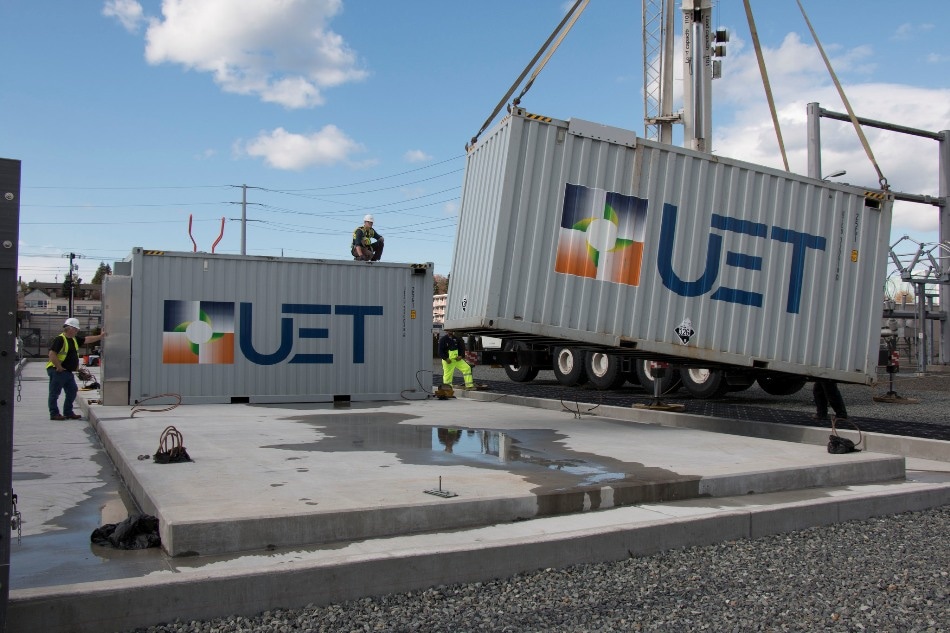Jun 14 2017
A Washington state company that produces a battery based on technology developed at the Department of Energy's Pacific Northwest National Laboratory has been honored with a Green Chemistry Challenge Award, the U.S. Environmental Protection Agency announced.
 UniEnergy Technologies' vanadium flow battery system is housed in shipping containers. The 2 Megawatt/8 Megawatt-hour system shown here was installed in March 2017 at a Snohomish PUD substation in Everett, Wash. The battery uses electrolyte chemistry developed at Pacific Northwest National Laboratory. (Credit: Snohomish PUD)
UniEnergy Technologies' vanadium flow battery system is housed in shipping containers. The 2 Megawatt/8 Megawatt-hour system shown here was installed in March 2017 at a Snohomish PUD substation in Everett, Wash. The battery uses electrolyte chemistry developed at Pacific Northwest National Laboratory. (Credit: Snohomish PUD)
UniEnergy Technologies — which is also known as UET, was founded in 2012, and has a 60,000 square-foot manufacturing facility near Seattle, Wash. — received the award in partnership with PNNL under the challenge's small business category. Both UET and PNNL will be honored during a ceremony in Washington, D.C., on June 12. Vincent Sprenkle, who oversees PNNL's grid-scale energy storage research portfolio, will receive the award on behalf of the lab at the ceremony.
The company's advanced vanadium redox flow battery uses a new electrolyte chemistry developed at PNNL with funding from DOE's Office of Electricity Delivery and Energy Reliability. The mixed-acid vanadium electrolyte can store 70 percent more energy and operates over a wider temperature range than conventional vanadium electrolytes.
"Research at PNNL has led to considerable technical improvements and substantial cost reductions resulting in a commercially viable flow battery," said Imre Gyuk, director of energy storage research at DOE's Office of Electricity Delivery and Energy Reliability. "As a result, we can now begin to move towards novel applications requiring longer storage durations."
The electrolyte enables UET's systems to store energy without experiencing degraded power or energy capacity, work over 20 years, have zero flammability, and be nearly 100 percent recyclable. UET's batteries are fully integrated with power electronics and controls, which helps the company's utility, independent power producer, microgrids and commercial and industrial customers make quick use of the energy storage system. The company's batteries have a lower total cost of ownership than batteries that use other chemistries such as lithium-ion batteries.
UET recently installed a 2 Megawatt/8 Megawatt-hour flow battery for Snohomish Public Utility District in Everett, Wash., that is the largest containerized flow battery system in the world. To date, the company has installed more than 14 Megawatt-hours of flow batteries to support a variety of grid services, including integrating renewable energy onto the power grid and ensuring power quality at manufacturing facilities. With over 155 Megawatt-hours of further systems ordered or awarded, UET's sales thus far have been in three countries and six U.S. states.
The Green Chemistry Challenge Awards "recognize chemical technologies that incorporate the principles of green chemistry into chemical design, manufacture, and use." UET was one of five organizations to win the awards this year.